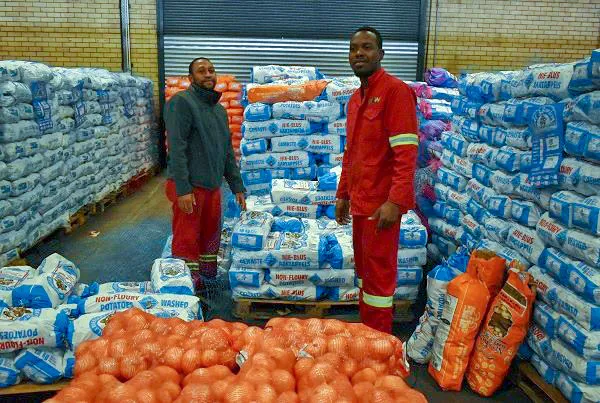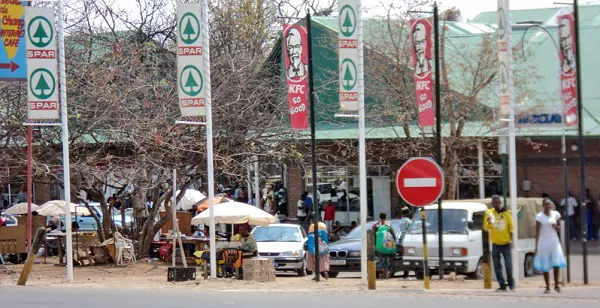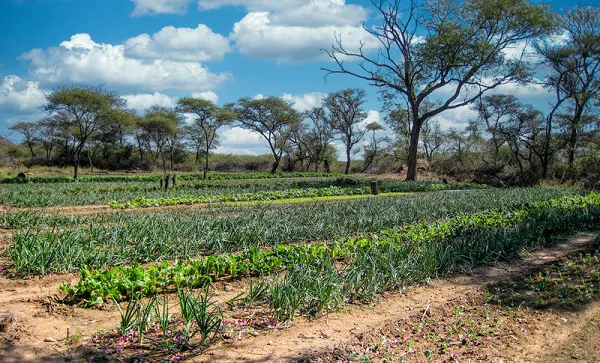Botswana and Namibia regularly close their borders to South African vegetables in an effort to incentivize local production and keep money home.
At the beginning of this year, Botswana again placed a total import restriction on a number of vegetables (including all bulk vegetables like potatoes, onions, tomatoes, cabbage and carrots) but this time, it was for two years straight.
Strawberries and watermelons are the only fruit on the list that also includes spinach, butternut, sweetcorn, herbs, lettuce, garlic, chillies, ginger and even turmeric.
Botswana border police scan the trucks that daily bring in produce from South Africa (those en route with South African fresh produce to Zambia and the Democratic Republic of the Congo are not at all affected.)
 Botswana's two-year ban on external procurement of many vegetables, including potatoes and onions, could be extended indefinitely in support of domestic production
Botswana's two-year ban on external procurement of many vegetables, including potatoes and onions, could be extended indefinitely in support of domestic production
Massive financial impact on retailers
A year on, FreshPlaza speaks to Kevin Morris about the impact of the closures. Kevin is the fresh produce supply manager at a Gaborone-based DC for 31 Spar stores across Botswana, owned by the Tsetseng Retail Group.
Kevin says that they have long been accustomed to working around border closures. The Botswana Ministry for Agricultural Development and Food Security provides a weekly list of restricted and non-restricted fresh produce along with the contact details of the farmers who are offering these vegetables.
Often, however, farmers on the government list of suppliers sell out quickly. “Or a grower tells you he has a lot – but how much is a lot? For him 100kg is a lot but I need 6 tonnes.”
Three months without potatoes or onions
The government visits producers to check stock levels but the crux of the problem, Kevin maintains, is that it’s not possible to produce everything that Botswana needs all year round.
“Strengthening food security is undoubtedly the right thing to do,” he says. “We just feel they’re going about it the wrong way. We comprehend the reasons behind the decision, but the way it’s done is difficult to understand.”
He remarks that when the two year ban was announced last December, producers weren’t ready to assume the complete supply of potatoes, onions and tomatoes (among others). Consequently since the start of the ban at the beginning of the year, they’ve gone for three months without potatoes, onions and recently no tomatoes for a while.
 Spar in the town of Kasane, northeastern Botswana (photo © Angela Perryman | Dreamstime.com)
Spar in the town of Kasane, northeastern Botswana (photo © Angela Perryman | Dreamstime.com)
He notes that the closing of the borders has had a massive financial impact on retailers.
“Many of the commercial farmers in Botswana are genuinely very good, on par with South African farmers with hydrocooling and so forth, but the reality is that certain products you just cannot grow here certain times of the year. South Africa has different climates, in Botswana we have just one climate: it’s either very hot or it’s boiling hot.”
Low yield and very high prices on midsummer potatoes
Until recently they have been receiving potatoes from the Tuli block, close to the border with Zimbabwe and South Africa, until recent copious rains and high temperatures brought the season to an end. Now they are expecting to have no potatoes for the next week and a half until the change-over to potatoes grown in the Ghanzi district.
“In December and January they’re trying to grow potatoes but the yield is so low that we know the price will be very high. Temperatures in Botswana are unbelievably high,” notes Kevin.
For smaller farmers it has been a brilliant opportunity: they have been able to take advantage of the opportunities offered by a permanent seller’s market but Kevin notes it comes at a cost to quality.
“This has been the impact of the ban on end users because they can’t get a high quality product at a reasonable price,” he says.
He’s not expecting a reversal of the decision, despite announcements in September that the Western Cape government would approach Botswana on the matter (termed a “trade war” in local media).
There is an expectation that the two-year ban will become a permanent ban on the importation of potatoes, onions, tomatoes, cabbage, carrots and the seventeen others on the restricted list.
The Botswana government encourages stock farmers to diversify into vegetables. Unrestricted lines of fresh produce at the moment include fruit like bananas, papaya, citrus, mangos, avocados and grapes, as well as broccoli and cauliflower. These products are freely imported.
Consumers look for non-fresh alternatives
As a result of the periodic scarcity of certain lines of fresh produce, like a recent shortage in tomatoes, consumers have started finding non-fresh alternatives.
“Consumers have started buying tinned tomatoes or tomato-onion mixes if they can’t find fresh tomatoes in the store,” he says. “They’ve started learning to get by without fresh tomatoes.”
Ironically, tinned tomatoes are also imported.
To solve the three-month onion shortage, retailers were eventually allowed to import pillow packs with cut onions from South Africa. Botswana producers don’t produce pillow packs.
“The market for these lines is, however, small. It’s more expensive and therefore it’s out of reach of lower income groups.”
He remarks that there is a degree of resistance from the public when there are shortages, but the aims of self-reliance and food security enjoy widescale support.
At Botswana’s renowned tourist lodges, most international visitors have accepted the restricted fresh availability as part of the travel experience.
 A household vegetable garden in Botswana (photo © Lucian Coman | Dreamstime.com)
A household vegetable garden in Botswana (photo © Lucian Coman | Dreamstime.com)
Decrease in roadside vegetable sellers
Kevin further mentions the decrease he has noticed in roadside vegetable sellers. “There used to be plenty of vegetable sellers along the roads and they have definitely become fewer. They used to drive down to South Africa to buy produce, like a bakkie load of potatoes and they’d come back and sell it here. Now they can’t do that anymore and we can definitely see that the number of street sellers has shrunk.”
Namibia, another country which seeks to grow its fresh produce self-reliance, uses a different approach of import levies coupled with a mix of domestic and imported food when local production levels reach certain thresholds.
“For the Botswana government it’s about food security and I don’t think they’ll back down on that, but I do feel it’s hurting the economy. In my opinion product is being kept away from the consumer, and the less product there is available, the higher the prices.”
Many people have started growing vegetables that can withstand Botswana's high heat, like tomatoes, at home.
